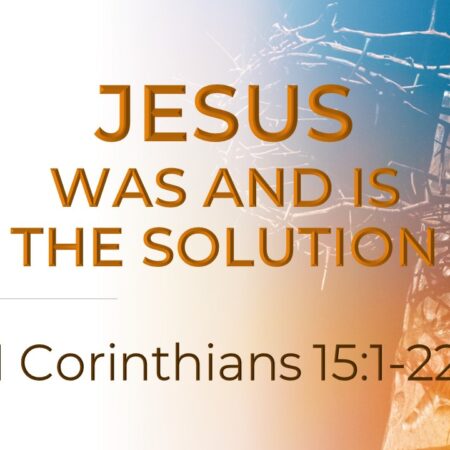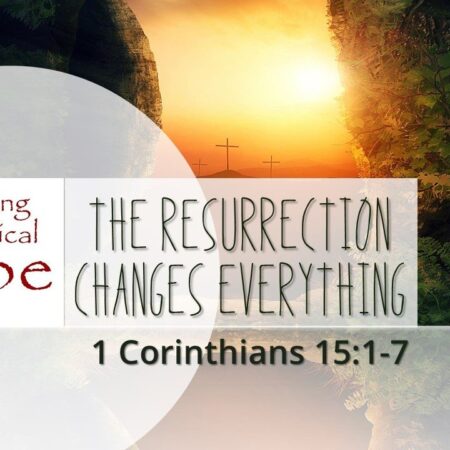1 Corinthians 15:1-22 John 3:16; Matthew 26:57-22; Daniel 7:9-14; Exodus 4:21-23; Matthew 27:35-46; Psalm 22:1; 7; 17-18; Psalm 22:12-13 Ephesians 4:4-10; Colossians 2:15; Colossians 1:15-20 Michael Heiser “Unseen Realm” “Israel…
Sermons on 1 Corinthians
1 Corinthians 10:10-22 1 Corinthians 10:1-6 1 Corinthians 10:7-12 John 8:31-32 1 Corinthians 10:20-22 Psalm 139:23-24 Dave Hunt in his book titled “Beyond Seduction” published 1987, writes: “Some people openly…
Carmen Joy Imes is an associate professor of Old Testament. In her dissertation titled: Bearing YHWH’s Name at Sinai: A Reexamination of the Name Command of the Decalogue” she writes:
”bearing the name of Yahweh is comparable in meaning to the High Priest bearing the names of the tribes of Israel on his breastplate and bearing the name of Yahweh on his forehead. He represents – in both directions – those whose name he bears. Similarly, those who bore the name of Yahweh, like those who bear the name of Christ, represented that name before a watching world. Israel was called to live in the midst of the nations as the people who bore the name of Yahweh and made Yahweh “visible” in the world by walking in his ways and reflecting his character. To bear the name of the Lord was not merely an inestimable privilege and blessing but a challenging ethical and missional responsibility.”
50 years ago, Os Guiness wrote a book titled: “The Dust of Death” with the subtitle: “The sixties counterculture and how it changed America forever.” He republished the book again 2018.
“Western civilization is in decline, and its lead society, the American Republic, is as deeply divided as at any time since just before the Civil War. But why? Is it simply a clash between the “coastals” (New York and California) and the “heartlanders” (the Midwest and the South), or between the “nationalists and populists” (President Trump’s “forgotten people”) and the “globalists” (of the George Soros-like Western elites)?
There are multiple causes of the deep and bitter polarization, but the deepest of all has been almost completely overlooked, and the sixties provided a massive thrust forward in this development.
The ultimate source of the current divisions in America is between those who understand the Republic, and above all freedom, from the perspective of the American Revolution and those who understand the Republic and freedom from the perspective of the French Revolution and its heirs and their ideas.
Stop to reflect on ideas such us “progressivism,” “postmodernism,” “political correctness,” “identity and tribal politics”, “multiculturalism”, “social constructionism,” the “sexual revolution,” the recent rage for socialism, or the leftward drift of the Democratic party and many in the media.
It quickly becomes clear that these ideas have little or nothing to do with 1776 and the American Revolution and its views of freedom. Rather, they are rooted in ideas that come directly or indirectly from 1789 and the French Revolution, and behind it the French Enlightenment and its later heirs such as Karl Marx, Friedrich Nietzsche, Antonio Gramsci, Wilhelm Reich, Herbert Marcuse, Saul Alinsky and Michel Foucault.
Hence the significance of the 1960s and its expression of the “revolutionary faith” that has flowed down from the French Enlightenment and the French Revolution.
The “seismic sixties” was the decade when the radical ideas first broke through into mainstream American thinking and life. Even more importantly, the sixties were the years when many of the seeds of today’s most radical ideas were sown, only to flower more recently in their most destructive forms.”
Antonia Gramsci is such a person we never hear of. He was sitting in jail under Mussolini in the 1920 when he formulated the revolutionary vision into what is known as CULTURAL MARXISM. In his PRISON NOTEBOOKS he argued that
“the timeline should be slow and incremental rather than sudden. It’s goal must be to gain dominance in the “ruling class” through penetrating the “gatekeepers” and the “switch points” in a society – first “demoralizing” the previous leaders of the ruling class, and then slowly replacing them with new revolutionary ideas and narratives. If revolutionaries were to gain “mastery of human consciousness” in this way, they would not need concentration camps and mass murder. Even the KGB would be less important than the winning of the cultural gatekeepers.”
He called this process “The Long March”.
Os Guinness comments on this
“Fifty years later, it is clear that the long march through the institutions has succeeded beyond the wildest dreams of the late sixties. In much of the worlds of colleges and universities, the press and the media, and Hollywood and entertainment, many of the prominent ideas and attitudes reflect the thinking of 1789 and its heirs and not the ideals of 1776. America has been bewitched. The great American Republic is in the process and switching revolutions from the American to the French.
…the sixties sowed the dragon’s seeds that are producing the bitter harvest being reaped today. The roots of those ideas go back far earlier than the sixties, but it was the sixties that gave them the thrust that made them the destructive force they are today.”
Adam Sedgwick, Darwin’s former mentor in natural science at the University of Cambridge, wrote a letter to Darwin after reading ‘the origin of Species’.
In it Sedgwick wrote:
“Passages in your book…greatly shocked my moral taste. There is a moral or metaphysical part of nature as well as a physical. A man who denies this is deep in the mire of folly.
Tis the crown and glory of organic science that it does, through final cause, link material to moral. You have ignored this link.”
Robby Kossmann, a German zoologist who later became a medical professor, wrote an essay in 1880, titled:
“The Importance of the Life of an Individual in the Darwinian World View”.
He declared: “The Darwinian world view must look upon the present sentimental conception of the value of the life of a human individual as an overestimate completely hindering the progress of humanity. The human state also, like every animal community of individuals, must reach an even higher level of perfection, if the possibility exists in it, THROUGH THE DESTRUCTION OF THE LESS WELL ENDOWED INDIVIDUAL, for the more excellent endowed to win space for the expansion of its progeny…..
The state only has an interest in preserving the more excellent life at the expense of the less excellent.”
Richard Weikart in his book “From Darwin to Hitler” subtitled:
“Evolutionary Ethics, Eugenics, and Racism in Germany” wrote:
So, what are the connection between Darwinism and Hitler and are they really all that significant?
First, Darwinism undermined traditional morality and the value of human life. Then, evolutionary progress became the new moral imperative. This aided the advance of eugenics, which was overtly founded on Darwinian principles. Some eugenicists began advocating euthanasia and infanticide for the disabled. On a parallel track, some prominent Darwinists argued that human racial competition and war is part of the Darwinian struggle for existence. Hitler imbibed these social Darwinists ideas, blended in virulent anti-Semitism, and – there you have it: HOLOCAUST.
Madison Grant, president of the New York Zoological Society, in 1916 published a book titled: “The Passing of the Great Race”
“Mistaken regard for what is believed to be divine laws and a sentimental belief in the sanctity of human life tend to prevent both the elimination of defective infants and the sterilization of such adults as are themselves of no value to the community. The laws of nature require the obliteration of the unfit, and human life is valuable only when it is of use to the community or race.
Richard Weikhart summarizes the devastating impact Darwinism has in Europe and in America.
“Leading Darwinists agreed that natural processes could account for all aspects of human society and behavior, including ethics. They denied any possibility of divine intervention, heaped scorn on mind-body dualism, and rejected free will in favor of complete determinism. For them, every feature of the cosmos – including the human mind, society, and morality – could be explained by natural cause and effect. Everything was thus subject to the ineluctable laws of nature. As a corollary to this, science became the arbiter of all truth. Not even ethics or morality could escape the judgments and pronouncements of science.”
1 Corinthians 15:45-49
Thus it is written, “The first Adam became a living being”; the last Adam became a life-giving spirit.
But it is not the spiritual that is first but the natural, and then the spiritual. The first man was from the earth, a man of dust; the second man is from heaven.
As was the man of dust, so also are those who are of the dust, and as is the man of heaven, so also are those who are of heaven.
Just as we have borne the image of the man of dust, we shall also bear the image of the man of heaven.
Matthew 10:28-33
“And do not fear those who kill the body but cannot kill the soul. Rather fear him who can destroy both soul and body in hell. Are not two sparrows sold for a penny? And not one of them will fall to the ground apart from your Father. But even the hairs of your head are all numbered. Fear not, therefore; you are of more value than many sparrows. So everyone who acknowledges me before men, I also will acknowledge before my Father who is in heaven, but whoever denies me before men, I also will deny before my Father who is in heaven.”
Jordan Peterson wrote the bestseller “12 Rules for Life” – An Antidote to Chaos. It was published in 2018
Peterson’s book became an incredible bestseller because he was able to take ETERNAL TRUTHS AND APPLY THEM TO OUR MODERN PROBLEMS.
The foreword was written by Dr. Norman Doidge, MD, who authored the book titled ”THE BRAIN THAT CHANGES ITSELF”.
Let me read a short excerpt from this foreword that will lead us back to the Biblical text in a few minutes:
“Rules? More Rules? Really? Isn’t life complicated enough, restricting enough, without abstract rules that don’t take our unique, individual situations into account? And given that our brains are plastic, and all develop differently based on our life experiences, why even expect that a few rules might be helpful to us all?
People don’t clamour for rules, even in the Bible…..as when Moses comes down the mountain, after a long absence, bearing the tablets inscribed with ten commandments, and finds the children of Israel in revelry. They’d been Pharaoh’s slaves and subjects to these tyrannical regulations for four hundred years, and after that Moses subjected them to the harsh desert wilderness for another forty years, to purify them of their slavishness. Now, free at last, they are unbridled, and have lost all control as they dance wildly around an idol, a golden calf, displaying all manner of corporeal corruption.
“I’ve got some good news…….and I’ve got some bad news,” the lawgiver yells to them. “Which do you want first?”
“The good news!” the hedonists reply.
“I got Him from fifteen down to ten!”
“Hallelujah!” cries the unruly crowd. “And the bad?”
“Adultery is still in.”
So, rules there will be – but, please, not too many. We are ambivalent about rules, even when we know they are good for us. If we are spirited souls, if we have character, rules seem restrictive, an affront to our sense of agency and our pride in working out our own lives. Why should we be judged according to another’s rule?
And judged we are. After all, God didn’t give Moses “The Ten Suggestions,” he gave Commandments; and if I’m a free agent, my first reaction to a command might just be that nobody, not even God, tells me what to do, even if it’s good for me. But the story of the golden calf also reminds us that without rules we quickly become slaves to our passions – and there’s nothing freeing about that.
And the story suggests something more: unchaperoned, and left to our own untutored judgment, we are quickly to aim low and worship qualities that are beneath us – in this case, an artificial animal that brings out our own animal instincts in a completely unregulated way. The old Hebrew story makes it clear how the ancient felt about our prospects for civilized behavior in the absence of rules that seek to elevate our gaze and raise our standards.
One neat thing about the Bible story is that it doesn’t simply list its rules, as lawyers or legislators or administrators might; it embeds them in a dramatic tale that illustrates why we need them, thereby making them easier to understand.”
Francis Schaeffer in his book: “The God Who Is There”
“The Christian is to resist the spirit of the world. But when we say this, we must understand that the world spirit does not always take the same form. So the Christian must resist the spirit of the world IN THE FORM IT TAKES IN HIS OWN GENERATION. If he does not do this, he is not resisting the spirit of the world at all. This is especially so for our generation, as the forces at work against us are of such a total nature. It is our generation of Christians more than any other who need to heed these words attributed to Martin Luther:
“If I profess with the loudest voice and clearest exposition every portion of the truth of God except precisely that little point which the world and the devil are at that moment attacking, I am not confessing Christ, however boldly I may be professing Christ. Where the battle rages, there the loyalty of the soldier is proved, and to be steady on all the battlefields besides, is mere flight and disgrace if he flinches at that point.”
God highlighted 3 specific and important things for Joshua to do:
1. The Law was not to depart out of Joshua’s mouth. In other words, Joshua was to talk about the book of the Law.
2. He was to meditate on it day and night. In other words, Joshua had to reason out what Moses wrote down within it’s context.
3. Joshua was to practice the commands in his historic space-time situation.
Author Israel Shamir wrote an article In the UNZ Review titled: “Coronavirus Conspiracies”
In it he says:
“We are still in the early stage of the ongoing transformation, we still hope it will be over in the summer, or at least at autumn, or next winter, but most probably our life was we knew is over. Can we blame it on the virus, even if it was manufactured in the evil labs of the US or China, as has been convincingly suggested by Ron Unz?
There are millions of viruses, and mankind had managed to live with them all. There was no reason to freak out and destroy our civilization for another virus.”
As journalist Israel Shamir wrote:
The process of shedding millions of workers in the existing economic system is likely to be painful for the unemployed. The virus-blamed lockdown and digital control allows the owners of the digital companies to carry out the REVOLUTION with minimal risks for them. What would need an army and police involvement against riotous unemployed workers, can be achieved with greater ease under threat of the pandemic. The economy will be modernized and made more efficient.”
But there is good news, there is a spiritual government in place that cannot be touched, manipulated or taken hostage by evil forces. This government is the true body of Christ, those who have been born of the spirit of God and are follower of Jesus, under the headship of Jesus Christ. This is not a government that WILL BE ONE DAY COME TO FRUITION. This Government, this kingdom is already here on this earth.
What is the Kingdom of God? Where is the Kingdom of God?
Wherever God (through Jesus Christ) is in authority, the Kingdom of God is present.
There are three phases of the Kingdom of God in the Bible:
• When Jesus was in person on earth, the first phase of the Kingdom was present.
• The second phase of the Kingdom is the age of the Church, the invisible Kingdom in the hearts of men, women and children.
• The third phase of the Kingdom will begin when Jesus returns to earth and establishes His Kingdom worldwide.
Robert H. Bennett writes in his book “AFRAID – Demon possession and spiritual warfare in America”
“Is American spirituality afraid? Modern-day society lives in fear. With the decline in modernity and the rise of postmodernism, people are required to form new ways of understanding their world. They are reverting to a form of religious paganism that is the basis of all tribal and animistic worldviews.
Many churches have accepted a theological pluralism (an acceptance of diverse theological belief) that can also be described as spiritualism. But the spiritualist worldview that has become prominent in today’s churches is nothing new to Christianity. The Christian Church has existed in the midst of pluralistic religious environments since its establishment by Jesus and the sending out of His disciples.
All of the creeds and confessions of historic Christianity are in response to the heresies of history. The difference between the churches of the past and the churches of today lies in their response to attacks, which are increasing with ever-growing frequency. Rather than continuing to PROVIDE A PLACE OF SANCTUARY from the lies of Satan, his demons, and the world, many churches have embraced a concept OF PERSONAL EXPERIENCE THAT OVERSHADOWS DIVINE REVELATION.
In a sense, churches have let the demonic genie out of the bottle and welcomed him into the church.
This became evident in the church-growth movement, which sought to make worship “more relevant” so as to bring more people into the church. As a result of focusing on personal comfort and experience, the church-growth movement replaced (or at least added to) the truths of Scripture with modern marketing techniques connected to the social sciences.
The problems such an inconsistent theology can bring to those within the Church who have minimal biblical knowledge should be evident: INCONSISTENCY LEAD TO ANXIETY DURING TIMES OF PERSONAL STRUGGLES, AND ANXIETY LEADS TO FEAR. The Christian faith is not one of fear nor is it an inconsistent faith.”
In 1910 Teddy Roosevelt gave the famous speech titled:
“Citizenship in a Republic” here is a passage of this speech.
“If a man’s efficiency is not guided and regulated by a moral sense, then the more efficient he is the worse he is, the more dangerous to the body politic. Courage, intellect, all the masterful qualities, serve but to make a man more evil if they are merely used for that man’s own advancement, with brutal indifference to the rights of others. It speaks ill for the community if the community worships those qualities and treats their possessors as heroes regardless of whether the qualities are used rightly or wrongly. It makes no difference as to the precise way in which this sinister efficiency is shown. It makes no difference whether such a man’s force and ability betray themselves in a career of money-maker or politicians, soldier or orator, journalist or popular leader. If the man works for evil, then the more successful he is the more he should be despised and condemned by all upright and far-seeing men. To judge a man merely by success is an abhorrent wrong; and if the people at large habitually so judge men, if they grow to condone wickedness because the wicked men triumphs, they show their inability to understand that in the last analysis free institutions rest upon the character of citizenship, and that by such admiration of evil they prove themselves unfit for liberty.”
“The cost of freedom is always high, but Americans have always paid it. And one path we shall never choose, and that is the path of surrender, or submission.” John F. Kennedy
1 Corinthians 2:7-8 Matthew 22:36-40 Matthew 28:18-20 Ephesians 3:7-10 John 14:26 Acts 1:4-5, 8 Acts 2:1-4 Deuteronomy 32:8 Colossians 2:13-15 Ephesians 1:15-21 Psalm 82:2-5
1 Corinthians 15:1-7 John 11:17-27 1 Corinthians 15:12-22; 2 Corinthians 5:14-20 1. His followers WITNESSED HIS MIRACLES 2. His followers EMBRACED HIS TEACHINGS Matthew 13:1-23 3. His followers WATCHED HIS CRUCIFIXION…







